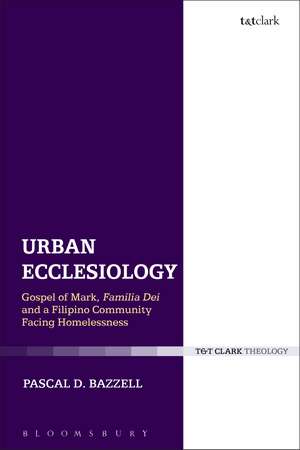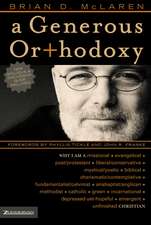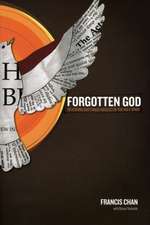Urban Ecclesiology: Gospel of Mark, Familia Dei and a Filipino Community Facing Homelessness: Ecclesiological Investigations
Autor Pascal D. Bazzellen Limba Engleză Paperback – 25 iul 2018
| Toate formatele și edițiile | Preț | Express |
|---|---|---|
| Paperback (1) | 238.11 lei 6-8 săpt. | |
| Bloomsbury Publishing – 25 iul 2018 | 238.11 lei 6-8 săpt. | |
| Hardback (1) | 774.20 lei 6-8 săpt. | |
| Bloomsbury Publishing – 20 mai 2015 | 774.20 lei 6-8 săpt. |
Din seria Ecclesiological Investigations
- 22%
 Preț: 949.17 lei
Preț: 949.17 lei - 22%
 Preț: 888.81 lei
Preț: 888.81 lei - 22%
 Preț: 948.75 lei
Preț: 948.75 lei -
 Preț: 256.49 lei
Preț: 256.49 lei -
 Preț: 256.77 lei
Preț: 256.77 lei - 23%
 Preț: 255.29 lei
Preț: 255.29 lei - 14%
 Preț: 192.73 lei
Preț: 192.73 lei - 13%
 Preț: 258.77 lei
Preț: 258.77 lei - 22%
 Preț: 257.68 lei
Preț: 257.68 lei - 22%
 Preț: 257.12 lei
Preț: 257.12 lei - 14%
 Preț: 196.17 lei
Preț: 196.17 lei - 13%
 Preț: 257.32 lei
Preț: 257.32 lei - 22%
 Preț: 257.50 lei
Preț: 257.50 lei - 23%
 Preț: 255.66 lei
Preț: 255.66 lei -
 Preț: 257.86 lei
Preț: 257.86 lei - 13%
 Preț: 258.69 lei
Preț: 258.69 lei - 22%
 Preț: 239.02 lei
Preț: 239.02 lei - 22%
 Preț: 239.85 lei
Preț: 239.85 lei -
 Preț: 256.59 lei
Preț: 256.59 lei - 22%
 Preț: 259.34 lei
Preț: 259.34 lei -
 Preț: 257.68 lei
Preț: 257.68 lei -
 Preț: 257.97 lei
Preț: 257.97 lei
Preț: 238.11 lei
Preț vechi: 305.93 lei
-22% Nou
Puncte Express: 357
Preț estimativ în valută:
45.56€ • 49.69$ • 38.42£
45.56€ • 49.69$ • 38.42£
Carte tipărită la comandă
Livrare economică 24 aprilie-08 mai
Preluare comenzi: 021 569.72.76
Specificații
ISBN-13: 9780567672476
ISBN-10: 0567672476
Pagini: 272
Ilustrații: 1 b/w illustration
Dimensiuni: 156 x 234 mm
Greutate: 0.38 kg
Ediția:NIPPOD
Editura: Bloomsbury Publishing
Colecția T&T Clark
Seria Ecclesiological Investigations
Locul publicării:London, United Kingdom
ISBN-10: 0567672476
Pagini: 272
Ilustrații: 1 b/w illustration
Dimensiuni: 156 x 234 mm
Greutate: 0.38 kg
Ediția:NIPPOD
Editura: Bloomsbury Publishing
Colecția T&T Clark
Seria Ecclesiological Investigations
Locul publicării:London, United Kingdom
Caracteristici
Uses the methodology of an ecclesial ethnography that fits well within the current international scholarly discussion regarding ecclesiology and social science
Notă biografică
Pascal D. Bazzell, MA., MDiv., PhD., an OMF International member, is currently a Swiss National Science Postdoc Fellow at the Humboldt-University of Berlin, Germany. Originally from Switzerland, he served in the Philippines from 1998 - 2014 in church planting, community development and as a professor of intercultural theology in addition to being the missiology and religious studies department head at Koinonia Theological Seminary Foundation, Inc.. He has ministered for 10 years to various street-level communities in Davao City, Philippines with his wife Karina F. Ravello Bazzell and their three children.
Cuprins
Foreword by Amos YongAcknowledgementsTerminologyList of AbbreviationsPhilippines MapChapter 1: Being Church Among the HomelessChapter 2: Theoretical and Methodological ProlegomenaChapter 3: Ecclesiaslity and Locality of the ChurchChapter 4: Towards Naming the ContextChapter 5: A Contextual and Interdisciplinary Reading of Mark's GospelChapter 6: Towards a Familia Dei EcclesiologyChapter 7: A Church in the 'Filipino' ContextsAppendicesBibliography Index
Recenzii
How can the Church be a community of love and justice to migrants who live in cities, often as homeless? This challenging question is addressed, with bold imagination and theological depth, by Pascal D. Bazzell. On the basis of biblical teaching and the best contemporary theology of mission Bazzell puts forth an "embodied ecclesiology" in which the church functions as familia Dei, an image appealing not only to Filipinos but also to all who work with and for the poor. I most strongly recommend this book for pastors and theologians alike.
Pascal Bazzell's study of the ecclesiology of a homeless community is exemplary of how a local theology is to be done. He provides not only insight into a specific community's faith, but also raises important questions about what it means to belong to Christ for the larger church today.
What does it mean to be church in a community facing homelessness in Filipino society? This fascinating study by Pascal Bazzell draws on Scripture, theological sources and ethnographic studies, to demonstrate that even the homeless experience an ecclesial life. One can only agree that, in the author's own words, "in the midst of many different forms of grave suffering, injustice and oppression, something pure, holy and sacred is being born on the streets of Filipino society.
That this book appears in Bloomsbury's Ecclesiological Investigations series both marks important developments in contemporary thinking about the church and signals the opportunities and challenges of theology as an ever-increasingly interdisciplinary field of inquiry. On the one hand, ecclesiologists will be treated to a vision of the ekklesia that is robustly empirical in its methodology, equally reappropriative (of historical formulations) and creative (in looking ahead to the nature and being of the church in the twenty-first century) in its theological formulation, and concretely local and suitably global in its scope. On the other hand, the multi-disciplinary nature and missiological thrust of the discussion stretches the boundaries of approaches and trajectories of investigation typical in much of this series, if not also vis-a`-vis the main lines of ecclesiological reflection up to the present time.
Gerard Mannion's series, Ecclesiological Investigations, has produced impressive theological works that examine contemporary questions in ecclesiology, particularly from ecumenical and global perspectives. This work of Pascal Bazzell . is no exception.
Pascal Bazzell's study of the ecclesiology of a homeless community is exemplary of how a local theology is to be done. He provides not only insight into a specific community's faith, but also raises important questions about what it means to belong to Christ for the larger church today.
What does it mean to be church in a community facing homelessness in Filipino society? This fascinating study by Pascal Bazzell draws on Scripture, theological sources and ethnographic studies, to demonstrate that even the homeless experience an ecclesial life. One can only agree that, in the author's own words, "in the midst of many different forms of grave suffering, injustice and oppression, something pure, holy and sacred is being born on the streets of Filipino society.
That this book appears in Bloomsbury's Ecclesiological Investigations series both marks important developments in contemporary thinking about the church and signals the opportunities and challenges of theology as an ever-increasingly interdisciplinary field of inquiry. On the one hand, ecclesiologists will be treated to a vision of the ekklesia that is robustly empirical in its methodology, equally reappropriative (of historical formulations) and creative (in looking ahead to the nature and being of the church in the twenty-first century) in its theological formulation, and concretely local and suitably global in its scope. On the other hand, the multi-disciplinary nature and missiological thrust of the discussion stretches the boundaries of approaches and trajectories of investigation typical in much of this series, if not also vis-a`-vis the main lines of ecclesiological reflection up to the present time.
Gerard Mannion's series, Ecclesiological Investigations, has produced impressive theological works that examine contemporary questions in ecclesiology, particularly from ecumenical and global perspectives. This work of Pascal Bazzell . is no exception.
















